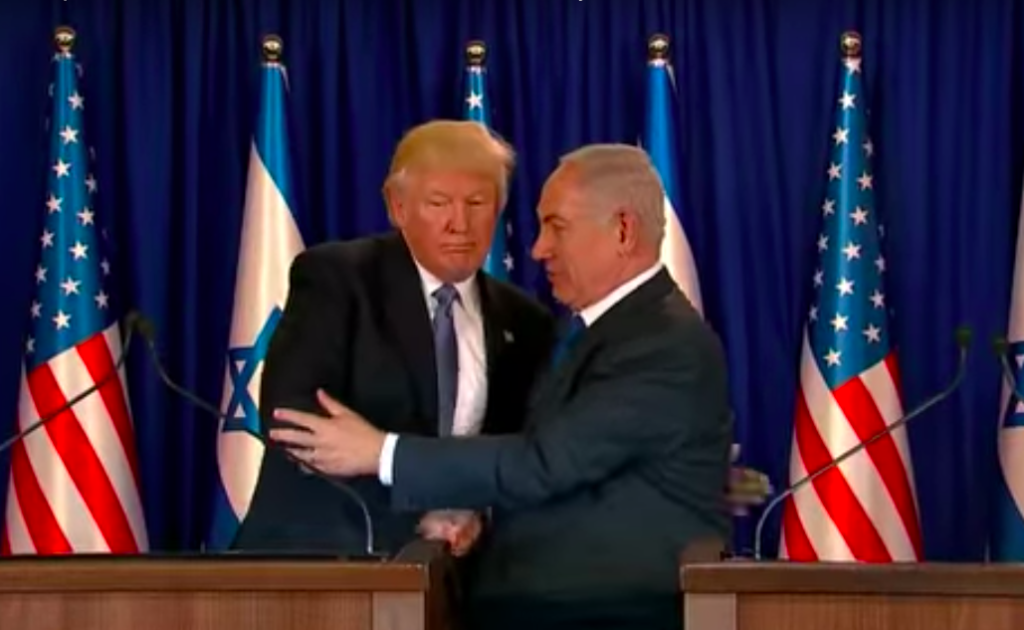
Israeli Prime Minister Benjamin Netayanu embraces US President Donald Trump after a joint press conference in 2018.
TEL AVIV: As Benjamin Netanyahu heads into his second general election in five months amidst rising tensions with Iran, the embattled Israeli prime minister is reportedly exploring a formal US-Israel alliance — a potential boost for his reelection campaign but a mixed blessing for Israeli national security.
Despite decades of de facto alliance, the US does not have a formal collective defense treaty that would legally require it to come to the defense of Israel.
According to the Israeli daily Maariv, Netanyahu is now examining a defense alliance between Israel and the United States. The newspaper says Israeli security sources have confirmed in recent days that the issue of an Israeli-American defense alliance at some level is indeed “in the air,” but no staff work has been done yet.
The Maariv report says that another possibility is to go for a “thinner” version of a defense agreement, a “defense pact.” This would take the form of a sweeping US presidential statement that would sound like a defense treaty, but would not be legally binding.
Ben Caspit, a political analyst here, says Netanyahu hopes to persuade the Trump Administration to commit to the treaty before the September election that will determine the embattled prime minister’s political fate. Even with such a commitment, however, extensive staff work would be needed before a legally binding agreement could be ready for consideration, and that cannot be completed before September.
The idea of a defense pact between Israel and the US has been discussed many times in the past. From Tel Aviv’s perspective, such an alliance would provide Israel protection under the American nuclear umbrella — but it would also undermine the independence of Israeli action.
In April, South Carolina Sen. Lindsey Graham said he wants the United States to enter into a mutual defense agreement with Israel to tell the world that “an attack against Israel would be considered an attack against the United States.” Graham told the annual meeting of the Republican Jewish Coalition in Las Vegas that it’s time for the U.S. to declare to the world how important its relationship is with Israel.
In Israel itself, however, the idea is being met with little enthusiasm. Maj. Gen. (Ret.) Giora Eiland, former head of the Israeli National Security Council, told Breaking Defense that he does not believe in “bombastic” agreements between countries: “In most cases such agreement are just a collection of words with no real substance.”
He said that the Israeli experience proves the best agreements between countries are about very specific and limited issues: “National interests are not something that you give away for a small reward made mostly of words.”
A former general in the Israeli airforce agreed that “there is no substance in such an alliance. The U.S will never let Israel fall,” with or without a treaty — but “an alliance also puts restrictions on both sides and in that case Israel will only lose heavily from such an alliance.”
Indeed, many would argue that Israel already possesses most of the benefits of an alliance. Military relations between the U.S and Israel are very close. For example, the US THAAD missile defense system was deployed in Israel for the first time in early March as part of a joint missile defense exercise, and the U.S is deeply involved in the development of some major Israeli defense systems such as the Arrow ballistic missile interceptor. And, of course, the United States plans to provide $38 billion in Foreign Military Financing over the next 10 years.
While Netanyahu may hope for a political bump from talk of a defense treaty or pact with the United States, at this point it looks likely to fail.
Iran says it shot down Israel’s attack. Here’s what air defense systems it might have used.
Tehran has been increasingly public about its air defense capabilities, including showing off models of systems at a recent international defense expo.


























